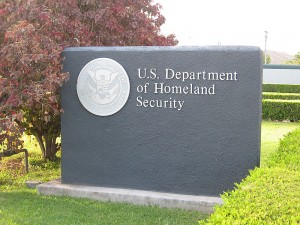 The Republican majority has refused to approve new funding for the Department of Homeland Security. Following the lead of the party’s most conservative members, congressional Republicans will reject a new DHS budget unless President Obama reverses his November 2014 executive order to protect more than 4 million immigrants from deportation. Republicans are right to obstruct the routine annual funding of DHS—but they are doing it for the wrong reasons.
The Republican majority has refused to approve new funding for the Department of Homeland Security. Following the lead of the party’s most conservative members, congressional Republicans will reject a new DHS budget unless President Obama reverses his November 2014 executive order to protect more than 4 million immigrants from deportation. Republicans are right to obstruct the routine annual funding of DHS—but they are doing it for the wrong reasons.
DHS would be an easy target of standard conservative critiques of big government. The third largest federal department is hugely wasteful, unaccountable, unmanageable, and emblematic of governmental mission creep. Yet President Obama has kept increasing the budget and expanding the reach of DHS—his most recent initiative is to increase the department’s role in cybersecurity through $6 billion in contracts with major military and intelligence contractors including Lockheed Martin and Booz Allen Hamilton.
The DHS funding debate lays bare the disjuncture between the department’s core mission and its actual operations; the political standard has largely ignored the DHS counterterrorism mission. Instead, the dispute over DHS has revolved around the traditional divides over immigration policy.
This is unfortunate. It is time to reconsider the notion of a having a homeland security department. Rather then routinely submitting and approving the budgets of the bureaucratic monstrosity that DHS has become, the executive branch and Congress should consider dismantling DHS. Separating immigration policy from the post-9/11 security framework is fundamental to ending the waste and creating any sustainable and sensible immigration policy reform.
A product of post-9/11 fear-driven politics, DHS is a conglomeration of twenty-two different agencies created by the Bush administration under the Homeland Security Act of 2002 with little consideration of the difficulties of merging such diverse agencies as FEMA, Secret Service, Border Patrol, and the Coast Guard. Prior to the creation of DHS, immigration and border control came under the jurisdiction of the Department of Justice and were regarded primarily as issues of regulation and law. Under DHS, counterterrorism and national security became the dominant framework for immigration and border policy.
President George W. Bush promised that the new federal department would “improve efficiency without growing government.” Furthermore, according to President Bush, the new federal department would eliminate “duplicative and redundant activities that drain critical homeland security resources.” Yet, with more than 240,000 employees, DHS is the third largest federal department—surpassing the Department of Justice and State Department, and with a larger budget than the latter. Democrats and Republicans alike have continually increased the DHS annual budgets.
One of the primary indications of the Department’s dysfunction and lack of direction is the continuing DHS inability to formulate a concise and consistent definition of “homeland security.” There was no consensus on the meaning of the term at the time of its creation. And there was absolutely no consideration of the implications of having governmental functions such as border control, emergency management, and immigration enforcement framed as security operations. Nonetheless, the budget for Customs and Border Protection (CBP), which includes the Border Patrol, has more than doubled since 2003– rising from $27 billion to $59 billion in 2014—and now accounts for 21 percent of the DHS budget, making it the largest DHS agency. The CBP is also the nation’s largest law enforcement agency.
The DHS funding debate lays bare the disjuncture between the department’s core mission and its actual operations.
With each new director and changes in political issues, DHS tweaks the definition of the term and its mission statement. Defining Homeland Security, a January 2013 report by the Congressional Research Service, underscored the existential crisis facing DHS as its counterterrorism mission has lost focus. CRS observed: “Ten years after the September 11, 2001 terrorist attacks, the U.S. government does not have a single definition for ‘homeland security.’ [Instead,] different strategic documents and mission statements offer varying missions that are derived from different homeland security definitions.”
For instance, DHS programs now provide grants to local and state police for purchasing license plate readers, military-grade vehicles, surveillance equipment, and drones. And DHS continues to fund dozens of “fusion centers,” which were established as decentralized counterterrorism intelligence centers but have tracked lawful citizen organizing, including the Occupy Wall Street movement.
Another sign of DHS dysfunction is the low morale of department employees and officials. No other federal department suffers such high rates of job dissatisfaction. Not only does DHS rank as the department with lowest morale, the level of contentedness within DHS has also been dropping at a faster rate than any other department—decreasing 7 percent in the last four years, according to a Government Accountability Office (GAO) report.
DHS employees and officials cite the department’s stifling bureaucracy and lack of performance measures among the many reasons for plummeting morale. The agency has spent at least $2 million on four studies seeking strategies to improve morale. But no study questioned the viability of a department with so many clashing cultures and one whose operations are so diffuse.
No other federal department is subject to greater congressional oversight. Some ninety congressional committees and subcommittees monitor DHS operations. But this extensive oversight hasn’t produced a more effective and cost-efficient department. To the contrary. Doing the rounds before these congressional committees, DHS officials shape their statements according to the political agendas of committee chairmen, thereby further contributing to the mission drift of DHS.
Rather than providing effective oversight, congressional committees—notably the House Homeland Security Committee and its Border and Maritime Security Subcommittee—function more as boosters and cheerleaders. Eager to display their hardline positions on border security or immigration enforcement, congressional members keep pushing DHS to ramp up its border security operations, resulting in a trail of monumental boondoggles such as the virtual border fence, intelligence fusion centers, deployment of military-grade drones to the border, and a border wall that costs $1–7 billion each mile (depending on the terrain) to construct. Without effective congressional oversight and with constant congressional pressure to expand DHS operations, the department relies heavily on private contractors—many of whom also generously contribute to the election campaigns of committee members—for the management and implementation of core DHS functions, such as cybersecurity.
Over the past dozen years, governmental research and monitoring agencies have published an ever-expanding library of reports that the agency’s waste and failure. Hundreds of reports by the Congressional Research Service, GAO, and the DHS Office of Inspector General have painted a picture of an agency badly divided and highly dysfunctional.
Since its creation, the GAO has identified DHS as a “high risk” government agency, pointing to the continuing challenge of integrating twenty-two agencies into one department. The GAO states that DHS has made progress but that the challenges of managing the mix of diverse agencies continue to impact “the department’s ability to satisfy its missions.” According to the GAO, “DHS’s management and mission risks could have serious consequences for U.S. national and economic security.
After more than a dozen years, DHS is still floundering in its efforts to construct its own headquarters. Originally projected to cost $3.9 billion, DHS headquarters is $1.5 billion over budget and twelve years behind schedule. Completion was projected for this year, but according to the GAO it will not likely be finished until 2026. Meanwhile, the twenty-two DHS agencies remain scattered in fifty offices in the Washington, DC area. The GAO says that DHS should consider alternatives.
Dismantling DHS would be likely easier than consolidating it and refocusing its mission. Indeed, if Obama wants to decouple immigration and border policies from counterterrorism and security policies, dismantling DHS may be the only way.
Otherwise, the recent immigration order—paired with a call for increased funding for border security, the hiring of 20,000 more Border Patrol agents, and a commitment to “crack down on illegal immigration at the border—just looks like playing politics.
Tom Barry directs the Transborder Program at the Center for International Policy and is a contributor to the Americas Program www.americas.org. This news commentary was first published by the Boston Review at: https://www.bostonreview.net/blog/tom-barry-dismantle-department-homeland-security-immigration



